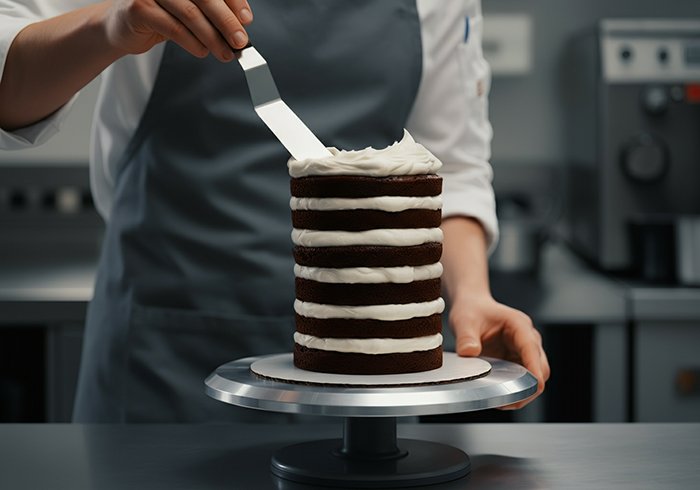
Step into any successful bakery, and you’ll find a dynamic environment filled with the scents of everything from crusty bread to delicate cakes and rich cookies. Behind this diverse array of products is a kitchen built for efficiency and consistency. At the heart of that kitchen, you will almost certainly find a true workhorse: the commercial planetary mixer. This single piece of equipment is arguably one of the most critical investments a bakery can make, valued not for doing one thing perfectly, but for doing nearly everything exceptionally well. Understanding its role is key to building a productive and versatile bakery operation.
What is a Commercial Planetary Mixer?

A commercial planetary mixer gets its name from its unique mixing action, which mimics the orbit of planets. The mixing agitator—be it a dough hook, flat beater, or wire whip—spins on its own axis while simultaneously orbiting around the stationary bowl. This dual-motion ensures that the entire contents of the bowl are thoroughly and consistently mixed, eliminating “dead spots” and producing a homogenous product every time.
This is what distinguishes it from more specialized equipment like a spiral mixer, where both the hook and the bowl rotate, an action designed specifically for developing large volumes of bread dough. The planetary mixer, by contrast, is the master of versatility, designed to handle a wide spectrum of mixing tasks with a simple change of an attachment.
Where Can a Commercial Planetary Mixer Be Used?
The true value of a planetary mixer lies in its incredible range of applications. It is the multi-tool of the professional kitchen, capable of executing numerous critical tasks:
- General Mixing and Blending: Using the flat beater attachment, it excels at combining ingredients for cake batters, cookie doughs, scones, and biscuits. It’s also perfect for making fillings, icings, and spreads.
- Whipping and Aerating: With the wire whip (or whisk) attachment, the mixer efficiently incorporates air into liquids, making it ideal for creating light and airy meringues, whipped cream, mousses, and fluffy frostings.
- Kneading Dough: Equipped with a dough hook, a planetary mixer can effectively knead small to medium-sized batches of bread dough, pizza dough, brioche, and other yeast-leavened products, developing gluten structure for a perfect bake.
Because of this adaptability, it is an indispensable machine for bakeries, pastry shops, restaurants with in-house baking programs, and catering businesses.
Why Should You Choose a Commercial Planetary Mixer?
Opting for a commercial planetary mixer is a strategic decision that delivers substantial benefits to a bakery’s bottom line and product quality.
- Unmatched Versatility: This is its signature advantage. The ability to switch from kneading dough to whipping cream in minutes with one machine saves valuable kitchen space and reduces the need to invest in multiple, single-task machines.
- Superior Product Consistency: The planetary mixing action guarantees that all ingredients are fully incorporated. This reliability translates directly to a more consistent final product, which is the foundation of customer loyalty.
- Significant Workflow Efficiency: By automating the strenuous and time-consuming task of mixing, these machines free up bakers to focus on other critical areas like shaping, baking, and decorating. Their powerful motors handle heavy loads with ease, providing a notable improvement in productivity.
- Built for Professional Demands: Commercial models are constructed from durable materials with robust motors designed to withstand the rigors of a busy bakery. They are reliable, long-lasting investments built for continuous operation.
What Should You Consider When Selecting a Commercial Planetary Mixer?
To ensure you choose the right mixer for your needs, evaluate these key factors:
- Capacity and Size: Your mixer’s bowl size should align with your typical batch sizes. Countertop models are excellent for smaller bakeries, cafes, or for specific, smaller tasks in a larger kitchen. Floor models offer much larger capacities and are essential for high-volume production.
- Motor Power: Ensure the mixer’s motor has sufficient power to handle the toughest jobs on your menu, such as dense cookie or bread doughs. A robust motor prevents strain and ensures longevity.
- Speed Controls: Look for models with multiple speed settings. Different tasks require different speeds—a slow speed for incorporating dry ingredients without a mess, and a high speed for whipping cream effectively.
- Attachments: Confirm the mixer includes the three essential attachments: a flat beater, a wire whip, and a dough hook.
- Safety Features: Professional mixers should come standard with safety features like a bowl guard and an automatic shutoff switch, which are critical for protecting your staff during operation.
A commercial planetary mixer is far more than just a machine for mixing; it is the versatile, powerful, and reliable heart of a productive bakery. Its ability to adapt to nearly any recipe is what empowers creativity and enables a diverse, profitable menu. Investing in the right model is an investment in quality, efficiency, and the long-term success of your craft.
Ready to find the ultimate workhorse for your kitchen? Browse our comprehensive range of commercial planetary mixers or consult with our equipment experts to identify the perfect fit for your bakery’s unique needs.

